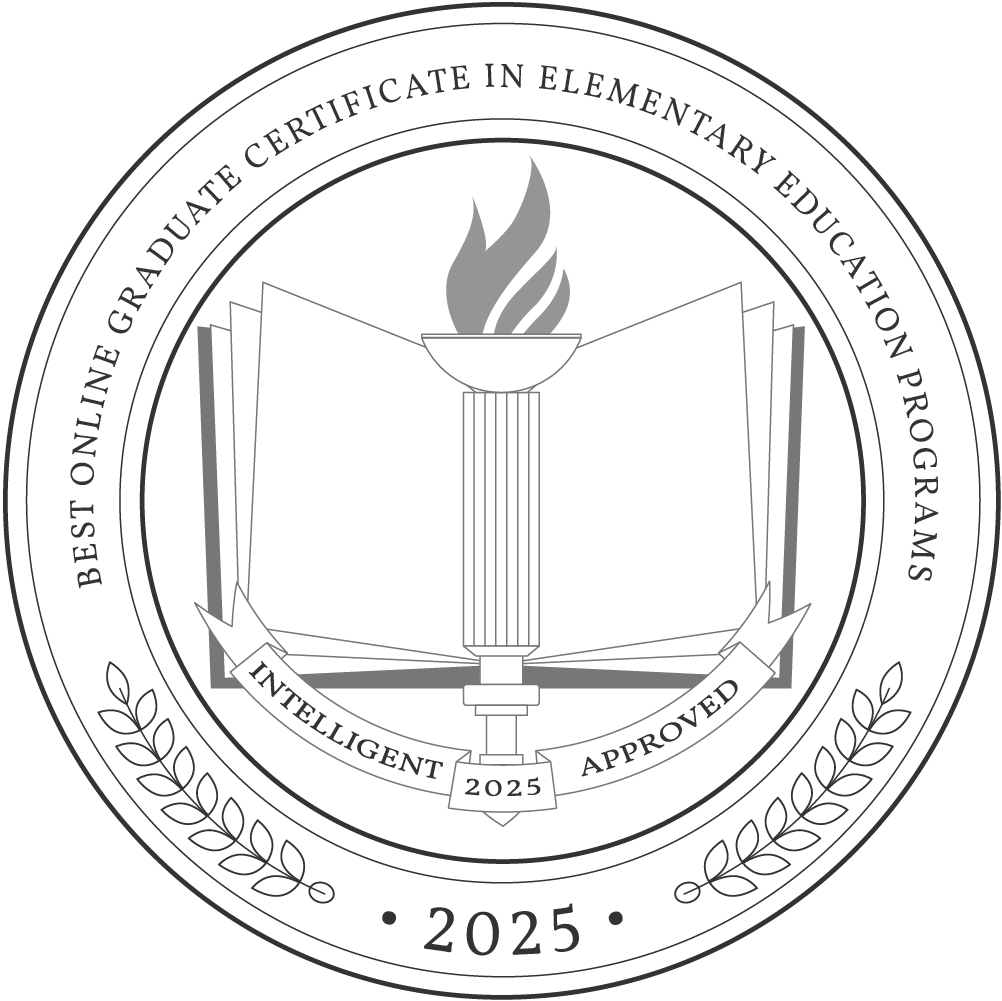If you already have a bachelor’s degree and are ready to begin a career as an elementary teacher, an online graduate certificate in elementary education can help you achieve your goals. These programs provide the qualifications needed to start a rewarding career shaping young minds.With a median salary of $63,680, elementary teachers have a solid earning potential, and the top 10% in the field make more than $104,440 annually. Here, we’ve compiled a list of the best online graduate certificate in elementary education programs, focusing on options that combine flexibility, affordability, and accreditation to set you on the path to success.
Why Trust Us
The Intelligent.com Higher Education Team is dedicated to providing students with independent, equitable school and program rankings and well-researched resources. Our expert-driven articles cover topics related to online colleges and programs, paying for school, and career outlooks. We use data from the U.S. Department of Education’s College Scorecard, the National Center for Education Statistics, and other reputable educational and professional organizations. Our academic advisory team reviews content and verifies accuracy throughout the year for the most current information. Partnerships do not influence rankings or editorial decisions.
- Analyzed over 2,000 national, accredited, and nonprofit colleges and universities
- 800+ rankings pages are reviewed and updated yearly
- Content is informed by reputable sources, surveys, and interviews with academic advisors and other experts
- Over 100 data points are reviewed for accuracy and quality throughout the year, including sources
How we rank schools
Our list features the best online Elementary Education degree programs at top colleges nationwide. Each school featured is a nonprofit, accredited institution — either public or private — with a high standard of academic quality for post-secondary institutions.
We evaluated each school’s program on tuition costs, admission, retention and graduation rates, faculty, reputation, and the student resources provided for online students. We collected data from trusted sources like the National Center for Education Statistics, individual school and program websites, school admissions counselors, and other data sources. Then, we calculated the Intelligent Score on a scale of 0 to 100 based on the following criterion:
Academic Quality:
- Admission rate versus enrollment rate
- Retention rate of students who return after year one
- Accreditation status (regional and programmatic)
- Nonprofit status, both private and public institutions
Graduation Rate
- Overall graduation rate
- Total number of currently enrolled students, including diversity metrics
- Student-to-faculty ratio
Cost and ROI
- In-state and out-of-state per-credit tuition rates and fees
- Required credits to graduate
- Earning potential after graduation
- Availability of federal student loans, scholarships, and other financial aid options
Student Resources
- Available student services for online-only and hybrid programs
- On-campus amenities like tutoring centers and the number of libraries
Read more about our ranking methodology.
Best 2 Online Graduate Certificate in Elementary Education Programs
FiltersInstitution Type
Status
- Intelligent Score
- Alphabetically By University Name
- Acceptance Rate
- Enrollment
- In-state Graduate Tuition
- Out-of-state Graduate Tuition
- In-state Undergraduate Tuition
- Out-of-state Undergraduate Tuition

Eastern New Mexico University
Intelligent Score: 98.7In-state: $4,074
Out-of-state: $6,114
In-state: $5,351
Out-of-state: $5,351
SAT: 950-1160
ACT: 17-23
$303
Online
Higher Learning Commission
21

Ball State University
Intelligent Score: 94.15In-state: $9,482
Out-of-state: $26,470
In-state: $9,328
Out-of-state: $9,328
SAT: N/A
ACT: N/A
Resident: $438
Non-Resident: $656
Online
Higher Learning Commission
15
What You Should Know About an Online Graduate Certificate in Elementary Education Program
When you’re comparing programs, it’s important to look at the type of certificate the school offers. If you want to specialize in a certain area or qualify for higher-level positions, you’ll need to ensure the certificate supports that.
Only apply to schools approved by a DOE-recognized accrediting organization, such as the New England Commission of Higher Education (NECHE) or Northwest Commission on Colleges and Universities (NWCCU). If your school isn’t accredited, you may be unable to access financial aid or transfer credits to another institution if needed.
To obtain a teaching position after graduation, you must be licensed as a teacher in your state. Requirements and deadlines vary, so check with your local board of education.
Finding the Right Online Program
Here are some questions to ask when researching online graduate certificate in elementary education programs:
- Am I eligible for this program? Most graduate programs only require an appropriate undergraduate degree and GRE scores to be admitted. However, some post-bachelor’s certificate programs may require you to have an active teaching license or a certain amount of work experience before getting accepted.
- How long does it take to complete this online degree? The certificate programs on our list range from only six credits up to 36 credits. It’s possible to complete your certificate program in just one semester if the number of credits required is lower, but most programs take one to two years.
As you’re narrowing down programs to your top choices, pay attention to deadlines. There will be due dates for applications, and you may need to submit paperwork such as undergraduate transcripts and letters of recommendation. If you require assistance to pay for your education, you’ll also need to visit the financial aid office to see what’s available to you.
Frequently Asked Questions About Online Graduate Certificate in Elementary Education Programs
What career opportunities are available with an online graduate certificate in elementary education?
These certificates qualify graduates for elementary teacher positions, providing them with the necessary skills to educate and inspire children in kindergarten through sixth grade. Elementary teachers design lesson plans, teach core subjects, assess student progress, and foster a positive learning experience. Beyond classroom teaching, this credential can provide leadership opportunities such as grade-level coordinator, instructional coach, or curriculum specialist.
With additional experience or further education, opportunities for roles like assistant principal, principal, or district administrator also become viable.
Are online graduate certificate in elementary education programs as credible as on-campus programs?
Online graduate certificate in elementary education programs are often as credible as on-campus programs, sharing the same curriculum and instructors. The primary difference lies in delivery, with online learning offering flexibility for working professionals.
Accreditation is vital for ensuring program credibility, and all of our top picks hold regional accreditation, the gold standard in higher education. This confirms that online programs meet the same academic standards and provide the same quality education as traditional programs.
How long does it take to complete an online graduate certificate in elementary education program?
The time it takes to earn this graduate certificate depends on the number of required credits, which usually range from 15 to 30. This translates to about one to two years of study. Some programs offer accelerated options for those who can commit more time, enabling completion in as little as a few months. Others are designed to accommodate part-time learners, providing the flexibility to balance education with a full-time job or other responsibilities.
Are there specialization options within online graduate certificate in elementary education programs?
Specialization options for this certificate are uncommon, as these programs are typically streamlined for quicker completion. They focus on core skills and knowledge needed for elementary teaching, prioritizing efficiency over customization.
For those seeking specialized training — such as in literacy, STEM education, or special education — a master’s degree in elementary education may be a better fit. A master’s program offers a more in-depth learning experience in specific areas, providing opportunities to tailor your education to your career goals while still preparing graduates for classroom roles.
What is the cost of an online graduate certificate in elementary education?
The cost of an online graduate certificate in elementary education usually depends on the required number of credits and the cost per credit. Most programs require 15 to 30 credits, with costs ranging from $300 to $650 per credit, resulting in a total investment of $4,500 to $19,500.
Speaking with a financial aid counselor is essential to better understanding your financial commitment. They can help clarify tuition costs, fees, and potential funding opportunities, such as scholarships and grants.
Compare School Options
Related Degrees
- Coaching
- Education
- Graduate Certificate in Elementary Education
- Educational Leadership
- Secondary Education
- Assessment and Measurement
- Reading and Literacy
- Math Education
- Educational Administration
- Elementary Education

